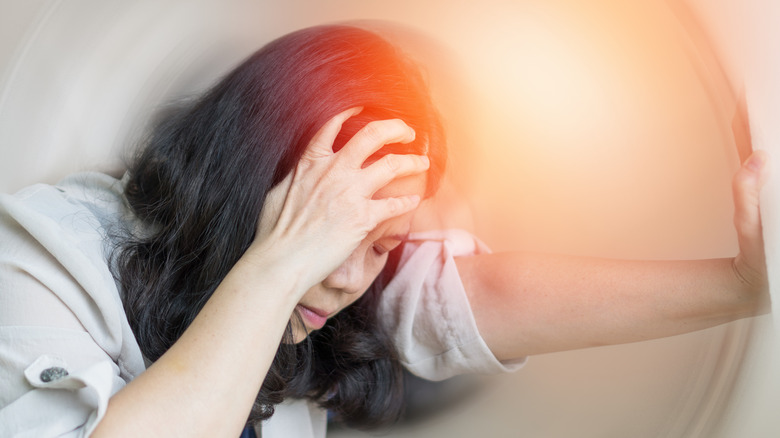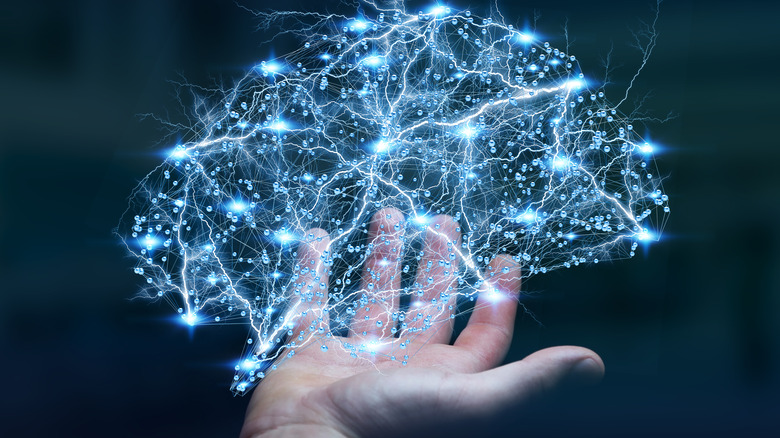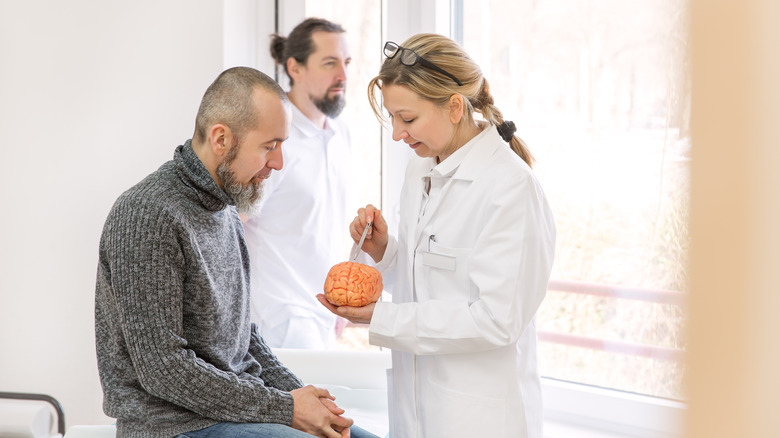What Happens If A Stroke Goes Untreated?
Recovering from a stroke can be difficult and frustrating. Only 10% of survivors recover almost completely, according to the American Stroke Association. Approximately 40% of those who go through this experience end up having moderate to severe impairments, such as paralysis, memory problems, or chronic pain. The National Institutes of Health (NIH) explains that it's also possible to develop aphasia, a condition that affects your ability to speak, write, or understand what others are saying. Depression and other emotional disturbances are common, too.
But things can get a lot worse if you don't take action immediately. The longer a stroke goes untreated, the greater the damage to your brain. The NIH recommends starting a rehabilitation program within 48 hours after the event. Rehab usually consists of psychotherapy, occupational and/or physical therapy, speech therapy, and medications. For example, your physical therapist may prescribe exercises designed to improve motor function, coordination, balance, and muscle strength.
The problem is that sometimes it can be difficult to recognize the symptoms of a stroke. These typically include arm weakness or numbness, face drooping, slurred speech, confusion, and difficulty walking, explains the Centers for Disease Control and Prevention (CDC). Most symptoms occur suddenly and tend to affect one side of the body. For example, you may notice that one arm drifts downward even when you try to lift both arms. If that happens, seek emergency care right away.
Untreated strokes can lead to permanent brain damage
The CDC reports that someone has a stroke every 40 seconds in the U.S. This condition affects more than 795,000 Americans each year and can lead to long-term disability. Strokes occur when a blood vessel in the brain becomes clogged, causing a lack of blood and oxygen flow. The same can happen when a blood vessel bursts (per CDC).
In either case, it's essential to act quickly. "Every minute you wait, hoping your symptoms will go away, you lose almost two million brain cells," warns Dr. Jeffrey Saver, professor of neurology (via WebMD). The more brain cells you lose, the higher your risk of disability.
Ischemic strokes, which result from a blockage in an artery supplying blood to the brain, unfold over 10 hours if left untreated, says Dr. Saver. "Compared with the normal rate of neuron loss in brain aging, the ischemic brain ages 3.6 years each hour without treatment," he explains. Therefore, every minute counts.
Note that any type of stroke can cause permanent damage to the brain, according to OakBend Medical Center. If you wait too long to get help, you may end up with speech and language problems, paralysis, behavioral changes, or cognitive impairment.
What to do if you think you're having a stroke
Dr. Jeffrey Saver told WebMD that it's critical to call 911 if you think you're having a stroke. Don't waste time trying to book an appointment with your family doctor or waiting for your symptoms to go away.
Make sure you also act quickly if you see someone having a stroke. In this case, you may want to help by driving them to the ER, but that's a mistake. Call an ambulance immediately and let the dispatcher know when the symptoms started, says nurse practitioner Jean D. Luciano (via Penn Medicine). She also suggests performing CPR if the person having a stroke is unconscious.
The symptoms of a stroke can subside within minutes, but that doesn't mean you're fine. When that happens, you may be dealing with a mini-stroke, explains Penn Medicine. This condition can lead to a subsequent stroke, causing severe brain damage. "Research suggests that one or more mini-strokes can progressively interfere with cognition and other brain functions that support balance, strength, and gait," warns neurologist William Likosky (via Aging Care). Again, your best bet is you seek emergency help as soon as you notice the first symptoms.



